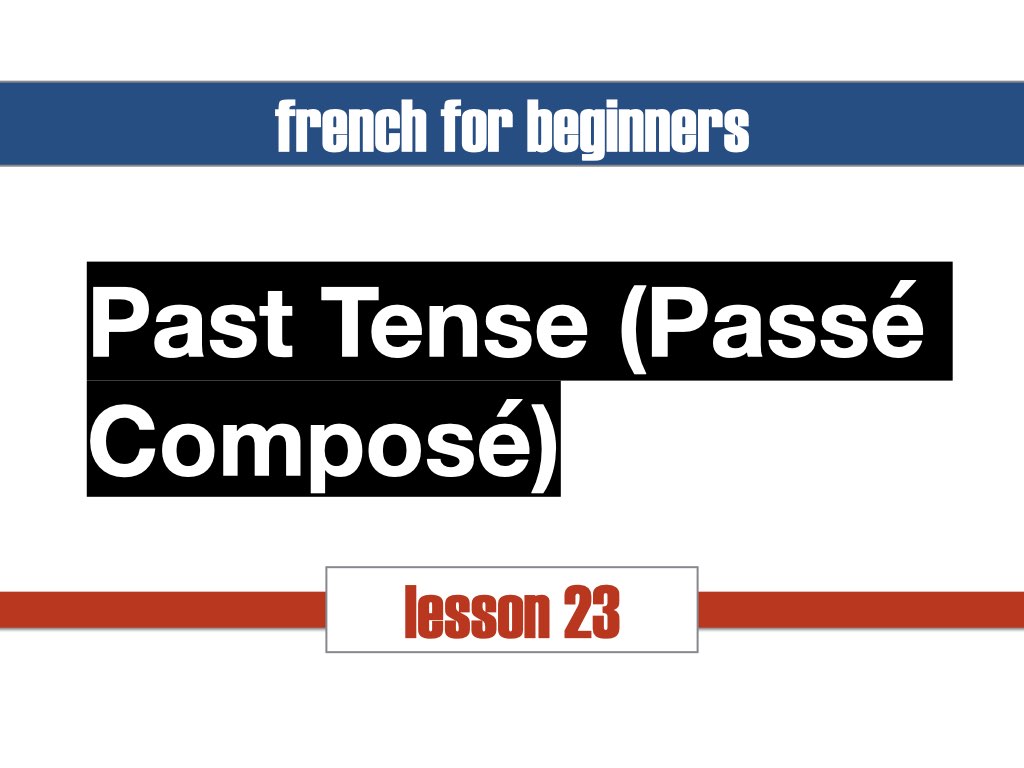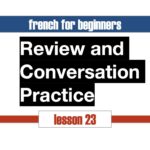Lesson 23: Passé Composé with “Avoir” for First Group Verbs
Introduction
In this lesson, we’re focusing on the passé composé tense in French, specifically using the auxiliary verb “avoir” combined with first group verbs. First group verbs are regular verbs ending in “-er” and are the most common verbs in French. Mastering the passé composé with these verbs is essential for discussing past events.
Understanding Passé Composé with “Avoir”
Formation
The passé composé is formed with the auxiliary verb “avoir” in the present tense followed by the past participle of the main verb. For first group verbs, the past participle is formed by replacing the -er ending with -é.
Structure
Subject + avoir (conjugated) + past participle
The past participle of first group verbs in French, which are verbs ending in “-er”, is formed by replacing the “-er” ending with “-é”. This rule applies to all regular verbs in this group, making it relatively simple to form the past participle for a wide range of actions. The past participle is used in various tenses, including the passé composé, to indicate completed actions in the past.
Examples of Conjugation
- Parler (to speak) → J’ai parlé (I spoke)
- Aimer (to like) → Tu as aimé (You liked)
- Regarder (to watch) → Il a regardé (He watched)
Examples:
- Parler (to speak) becomes parlé (spoken)
- “J’ai parlé avec mon ami hier.” (I spoke with my friend yesterday.)
- Aimer (to like/love) becomes aimé (liked/loved)
- “Elle a aimé le film.” (She liked the movie.)
- Danser (to dance) becomes dansé (danced)
- “Nous avons dansé toute la nuit.” (We danced all night.)
- Écouter (to listen) becomes écouté (listened)
- “Il a écouté de la musique.” (He listened to music.)
- Travailler (to work) becomes travaillé (worked)
- “Tu as travaillé dur sur ce projet.” (You worked hard on this project.)
The formation of the past participle for first group verbs is consistent, making it an essential and accessible aspect of French grammar to master for discussing past events.
✚ Key Vocabulary: First Group Verbs
| French Verb | Pronunciation | English Translation |
|---|---|---|
| aimer | eh-may | to like/to love |
| parler | par-lay | to speak |
| donner | doh-nay | to give |
| écouter | ay-koo-tay | to listen |
| travailler | tra-vai-yay | to work |
| regarder | re-gar-day | to watch |
| jouer | zhoo-ay | to play |
| danser | don-say | to dance |
| étudier | ay-too-dee-ay | to study |
| chanter | shan-tay | to sing |
| marcher | mar-shay | to walk |
| penser | pon-say | to think |
| arriver | a-ree-vay | to arrive |
| habiter | a-bee-tay | to live |
| dîner | dee-nay | to dine |
| voyager | voy-a-zhay | to travel |
| nager | na-zhay | to swim |
| dessiner | de-see-nay | to draw |
| laver | la-vay | to wash |
| préparer | pray-pa-ray | to prepare |
| porter | por-tay | to wear |
| acheter | ash-tay | to buy |
| utiliser | oo-tee-lee-zay | to use |
| oublier | oo-blee-ay | to forget |
| fermer | fair-may | to close |
| gagner | ga-nyay | to win |
| crier | cree-ay | to shout |
| pleurer | plu-ray | to cry |
| cuisiner | kwee-see-nay | to cook |
| envoyer | on-voy-ay | to send |
| ranger | ron-zhay | to tidy up |
| sauter | so-tay | to jump |
| lancer | lon-say | to throw |
| garder | gar-day | to keep |
| montrer | mon-tray | to show |
| trouver | troo-vay | to find |
| appeler | a-pel-ay | to call |
| rentrer | ron-tray | to return |
| demander | duh-mon-day | to ask |
| tomber | tom-bay | to fall |
| changer | shon-zhay | to change |
| ajouter | a-zhoo-tay | to add |
| visiter | vee-zee-tay | to visit |
| adorer | a-doh-ray | to adore |
| prêter | pray-tay | to lend |
| entrer | on-tray | to enter |
| rester | res-tay | to stay |
| quitter | kee-tay | to leave |
| commencer | ko-mon-say | to begin |
Exercises
✚ Exercise 1: Conjugate in Passé Composé
- Conjugate “avoir” in the present tense according to the subject (I, you, he/she, we, you all, they).
- Form the past participle of the verb by replacing the -er ending with -é.
Conjugate the following verbs in passé composé using “avoir”.
- Danser (to dance)
- Jouer (to play)
- Étudier (to study)
- Marcher (to walk)
Example :
Chanter (to sing)
- J’ai chanté (I sang)
- Tu as chanté (You sang)
- Il/Elle a chanté (He/She sang)
- Nous avons chanté (We sang)
- Vous avez chanté (You all sang)
- Ils/Elles ont chanté (They sang)
✚ Exercise 2: Translate to French
Translate the following sentences into French using passé composé.
- I listened to music.
- You (singular) played soccer.
- He worked yesterday.
- We watched a movie.
- They liked the cake.
✚ Exercise 3: Complete the Sentence
Fill in the blanks to complete the sentences with the correct form of verbs in passé composé.
- Nous _______ (aimer) le concert.
- Elle _______ (regarder) la télévision.
- Tu _______ (manger) une pomme.
- Je _______ (dîner) à huit heures.
- Ils _______ (habiter) à Paris.
Conclusion
The passé composé with “avoir” for first group verbs is a foundational aspect of conversing about past activities in French. By understanding its formation and practicing with these exercises, you’ll be well on your way to discussing a wide range of past events. Continue practicing to enhance your proficiency. Bonne continuation!


